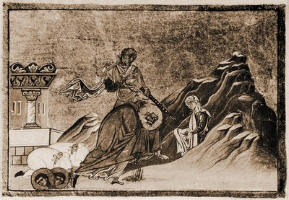
The Works Of Dionysius The Areopagite Volumes 1 & 2
SECTION I
IN the Theological Outlines, then, we celebrated the principal affirmative expressions respecting God—how the Divine and good Nature is spoken of as One—how as Threefold—what is that within it which is spoken of as Paternity and Sonship—what the Divine name of “the Spirit” is meant to signify,—how from the immaterial and indivisible Good the Lights dwelling in the heart of Goodness sprang forth, and remained, in their branching forth, without departing from the coeternal abiding in Himself and in Themselves and in each other,—how the super-essential Jesus takes substance in veritable human nature—and whatever other things, made known by the Oracles, are celebrated throughout the Theological Outlines; and in the treatise concerning Divine Names, how He is named Good—how Being—how Life and Wisdom and Power—and whatever else belongs to the nomenclature of God. Further, in the Symbolical Theology, what are the Names transferred from objects of sense to things Divine?—what are the Divine forms?—what the Divine appearances, and parts and organs?—what the Divine places and ornaments?—what the angers?—what the griefs?—and the Divine wrath?—what the carousals, and the ensuing sicknesses?—what the oaths,—and what the curses?—what the sleepings, and what the awakings?—and all the other Divinely formed representations, which belong to the description of God, through symbols. And I imagine that you have comprehended, how the lowest are expressed in somewhat more words than the first. For, it was necessary that the Theological Outlines, and the unfolding of the Divine Names should be expressed in fewer words than the Symbolic Theology; since, in proportion as we ascend to the higher, in such a degree the expressions are circumscribed by the contemplations of the things intelligible. As even now, when entering into the gloom which is above mind, we shall find, not a little speaking, but a complete absence of speech, and absence of conception. In the other case, the discourse, in descending from the above to the lowest, is widened according to the descent, to a proportionate extent; but now, in ascending from below to that which is above, in proportion to the ascent, it is contracted, and after a complete ascent, it will become wholly voiceless, and will be wholly united to the unutterable. But, for what reason in short, you say, having attributed the Divine attributes from the foremost, do we begin the Divine abstraction from things lowest? Because it is necessary that they who place attributes on that which is above every attribute, should place the attributive affirmation from that which is more cognate to it; but that they who abstract, with regard to that which is above every abstraction, should make the abstraction from things which are further removed from it. Are not life and goodness more (cognate) than air and stone? and He is not given to debauch and to wrath, more (removed) than He is not expressed nor conceived.

 Keep Site Running
Keep Site Running